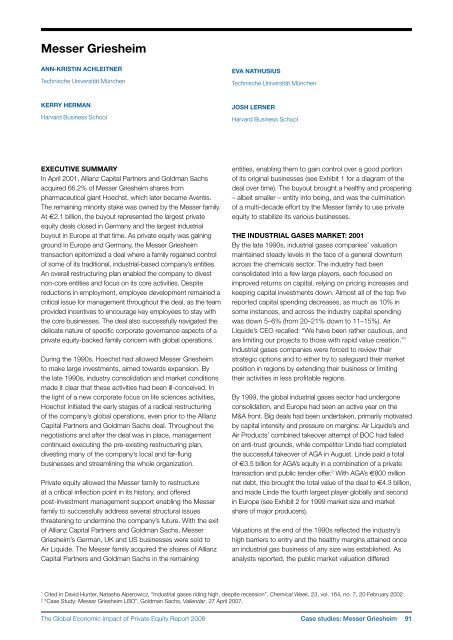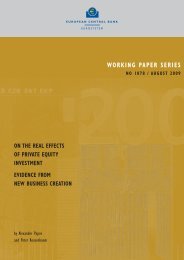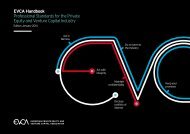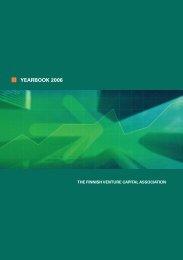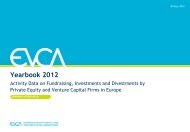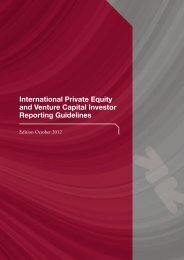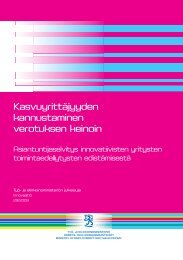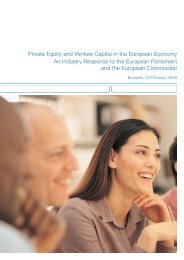The Global Economic Impact of Private Equity Report 2008 - World ...
The Global Economic Impact of Private Equity Report 2008 - World ...
The Global Economic Impact of Private Equity Report 2008 - World ...
- No tags were found...
Create successful ePaper yourself
Turn your PDF publications into a flip-book with our unique Google optimized e-Paper software.
Messer Griesheimann-kristin achleitnerTechnische Universität Müncheneva nathusiusTechnische Universität MünchenKerry hermanHarvard Business Schooljosh lernerHarvard Business Schoolexecutive summaryIn April 2001, Allianz Capital Partners and Goldman Sachsacquired 66.2% <strong>of</strong> Messer Griesheim shares frompharmaceutical giant Hoechst, which later became Aventis.<strong>The</strong> remaining minority stake was owned by the Messer family.At €2.1 billion, the buyout represented the largest privateequity deals closed in Germany and the largest industrialbuyout in Europe at that time. As private equity was gainingground in Europe and Germany, the Messer Griesheimtransaction epitomized a deal where a family regained control<strong>of</strong> some <strong>of</strong> its traditional, industrial‐based company’s entities.An overall restructuring plan enabled the company to divestnon‐core entities and focus on its core activities. Despitereductions in employment, employee development remained acritical issue for management throughout the deal, as the teamprovided incentives to encourage key employees to stay withthe core businesses. <strong>The</strong> deal also successfully navigated thedelicate nature <strong>of</strong> specific corporate governance aspects <strong>of</strong> aprivate equity‐backed family concern with global operations.During the 1990s, Hoechst had allowed Messer Griesheimto make large investments, aimed towards expansion. Bythe late 1990s, industry consolidation and market conditionsmade it clear that these activities had been ill‐conceived. Inthe light <strong>of</strong> a new corporate focus on life sciences activities,Hoechst initiated the early stages <strong>of</strong> a radical restructuring<strong>of</strong> the company’s global operations, even prior to the AllianzCapital Partners and Goldman Sachs deal. Throughout thenegotiations and after the deal was in place, managementcontinued executing the pre‐existing restructuring plan,divesting many <strong>of</strong> the company’s local and far‐flungbusinesses and streamlining the whole organization.<strong>Private</strong> equity allowed the Messer family to restructureat a critical inflection point in its history, and <strong>of</strong>feredpost‐investment management support enabling the Messerfamily to successfully address several structural issuesthreatening to undermine the company’s future. With the exit<strong>of</strong> Allianz Capital Partners and Goldman Sachs, MesserGriesheim’s German, UK and US businesses were sold toAir Liquide. <strong>The</strong> Messer family acquired the shares <strong>of</strong> AllianzCapital Partners and Goldman Sachs in the remainingentities, enabling them to gain control over a good portion<strong>of</strong> its original businesses (see Exhibit 1 for a diagram <strong>of</strong> thedeal over time). <strong>The</strong> buyout brought a healthy and prospering– albeit smaller – entity into being, and was the culmination<strong>of</strong> a multi‐decade effort by the Messer family to use privateequity to stabilize its various businesses.the industrial gases market: 2001By the late 1990s, industrial gases companies’ valuationmaintained steady levels in the face <strong>of</strong> a general downturnacross the chemicals sector. <strong>The</strong> industry had beenconsolidated into a few large players, each focused onimproved returns on capital, relying on pricing increases andkeeping capital investments down. Almost all <strong>of</strong> the top fivereported capital spending decreases, as much as 10% insome instances, and across the industry capital spendingwas down 5–6% (from 20–21% down to 11–15%). AirLiquide’s CEO recalled: “We have been rather cautious, andare limiting our projects to those with rapid value creation.” 1Industrial gases companies were forced to review theirstrategic options and to either try to safeguard their marketposition in regions by extending their business or limitingtheir activities in less pr<strong>of</strong>itable regions.By 1999, the global industrial gases sector had undergoneconsolidation, and Europe had seen an active year on theM&A front. Big deals had been undertaken, primarily motivatedby capital intensity and pressure on margins: Air Liquide’s andAir Products’ combined takeover attempt <strong>of</strong> BOC had failedon anti‐trust grounds, while competitor Linde had completedthe successful takeover <strong>of</strong> AGA in August. Linde paid a total<strong>of</strong> €3.5 billion for AGA’s equity in a combination <strong>of</strong> a privatetransaction and public tender <strong>of</strong>fer. 2 With AGA’s €800 millionnet debt, this brought the total value <strong>of</strong> the deal to €4.3 billion,and made Linde the fourth largest player globally and secondin Europe (see Exhibit 2 for 1999 market size and marketshare <strong>of</strong> major producers).Valuations at the end <strong>of</strong> the 1990s reflected the industry’shigh barriers to entry and the healthy margins attained oncean industrial gas business <strong>of</strong> any size was established. Asanalysts reported, the public market valuation differed1Cited in David Hunter, Natasha Alperowicz, “Industrial gases riding high, despite recession”, Chemical Week, 23, vol. 164, no. 7, 20 February 2002.2“Case Study: Messer Griesheim LBO”, Goldman Sachs, Vallendar, 27 April 2007.<strong>The</strong> <strong>Global</strong> <strong>Economic</strong> <strong>Impact</strong> <strong>of</strong> <strong>Private</strong> <strong>Equity</strong> <strong>Report</strong> <strong>2008</strong> Case studies: Messer Griesheim 91


